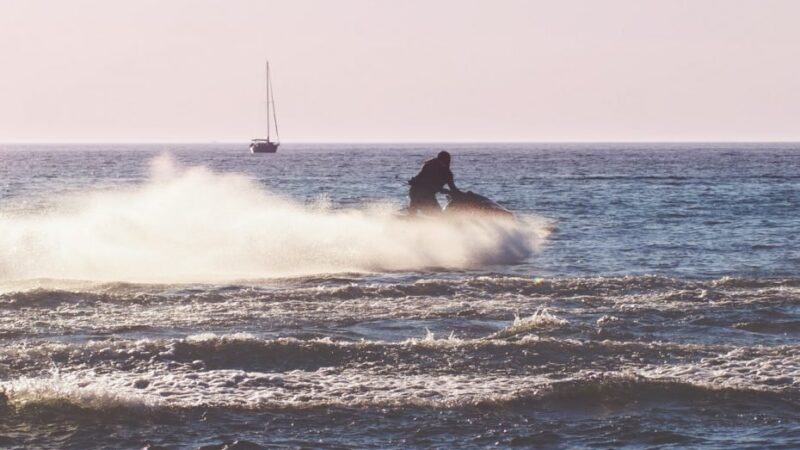Unsatisfied with Oregon State Marine Board’s decisions, the group petitions state agency to restrict some vessels

To say Willamette Riverkeeper Executive Director Travis Williams has been underwhelmed by the decisions the Oregon State Marine Board has made to safeguard the Willamette River from the adverse effects of large wakes might be an understatement
“In our experience, the Marine Board seems ill-equipped to act on this issue in some ways,” he said.
And with little faith that the board will implement more restrictive policies on wake-generating activities, the Riverkeeper group has turned to another state agency to do so.
The Willamette Riverkeeper, a 7,000-member organization, filed a petition to the Oregon Department of State Lands (DSL), which has authority to impose restrictions on state-owned land, requesting it to outlaw medium and large wakesurfing boats from occupying the Willamette River, and requested an order within 60 days or at least before the next boating season.
The petition says “DSL action limiting wake surfing boats is necessary due to the large, powerful boats repeatedly and unacceptably posing risks to human life, health and safety; loss and damage to real property; irreparable loss and damage to natural resources and the environment.”
Wakesurfing boats have been a point of controversy along the Willamette River for some time and the Marine Board has taken steps to address the issue including first imposing a ban on wake-enhancement devices in the Newberg Pool portion of the Willamette River, which is roughly from West Linn to Newberg, and then lifting the ban on WEDs and replacing it with a zonal approach where wakesurfing is allowed only in certain sections of the river.
However, the board agreed earlier this month to revisit the rulemaking process. The board also imposed a 10,000-pound limit on wake boats in the Newberg Pool as part of a boater education program, which will require wakeboarders and wakesurfers to take a class or pass an exam to perform those activities in that portion of the river.
Williams felt that the 10,000-pound limit wasn’t restrictive enough and the Riverkeeper’s petition asked for a 3,500-pound limit, which is the same as what is imposed at the private Oswego Lake. The average wake boat is between 8,000-to 10,000 pounds, according to Active Water Sports President Matt Radich’s testimony at the Oct. 24 Board meeting.
“In discussions with folks about that issue and recent testimony, a lot of people felt that the size of a boat and weight generated less of a trench in the river and as a consequence smaller waves,” Williams said. “We thought we could set this marker that is based on some precedent in the area.”
Lobbyist Greg Leo, who has helped mediate disputes between homeowners along the river and influenced recent legislation there, also has advocated for the 3,500-pound limit in the Newberg Pool.
“We find plowing activity in the Newberg Pool diminishes the ability of Oregonians to enjoy those activities (swimming, boating, canoeing etc.). It’s a choice between the interest of many users and the interests of (wakeboarders and wakesurfers),” he said at the board meeting.
Radich, however, said he felt that the 10,000-pound limit was the right number to prevent excessive wakes and that the 3,500-pound rule would effectively rid the river of wakesurfing and wakeboarding.
“Really what they are trying to do is get any boat doing wakeboarding or wakesurfing off the river, and that isn’t a fair way to go about it,” he said.
The deleterious effects of large wakes identified in the petition include harm to the ecosystem along the river including chinook salmon, macroinvertebrates and mussels, danger to other river users, damage to docks and degraded shorelines.
Williams said these effects aren’t just happening in the Newberg Pool, which is why the petition calls for the weight limit to be in place throughout the river.
“The same impacts occur below the falls that occurs above the falls, even though the geology is a little different,” he said.
Radich, for his part, believes that persistent efforts to limit wakesurfing and wakeboarding on the river are misguided and cited a study conducted last summer showing that a wakesurfing boat 300 feet away creates the same wave energy as a fishing boat from 100 feet away.
“The issue has nothing to do with a sport. It’s the wave that’s coming off of the boat. What about fishing boats, cruisers and other boats that weigh more than (wake activity boats)? It’s unfairly targeting watersports families,” he said.
Radich also did not agree with the idea that the Marine Board should be circumvented when it comes to river rulemaking.
“I think of all the state agencies, the Marine Board is most equipped to make rules when it comes to boating,” Radich said. “They (the Willamette Riverkeeper) don’t believe the Marine Board has done a good job because it hasn’t done exactly what they wanted.”
According to the petition, the Riverkeeper group restores habitats, organize boating trips and cleanup events and provide boating safety education, among other initiatives. Williams said the organization would rather focus on other issues to protect the river but that curbing wake impacts is too significant of a problem to ignore.
“We have a lot of issues in the Willamette Basin that affect river health,” Williams said. “It’s unfortunate that one related to a certain form of recreation and will likely pit river users against each other has to be something we need to address. In this case, it’s more than justified.”
Quality local journalism takes time and money, which comes, in part, from paying readers. If you enjoy articles like this one, please consider supporting us.
(It costs just a few cents a day.)







Recent Comments